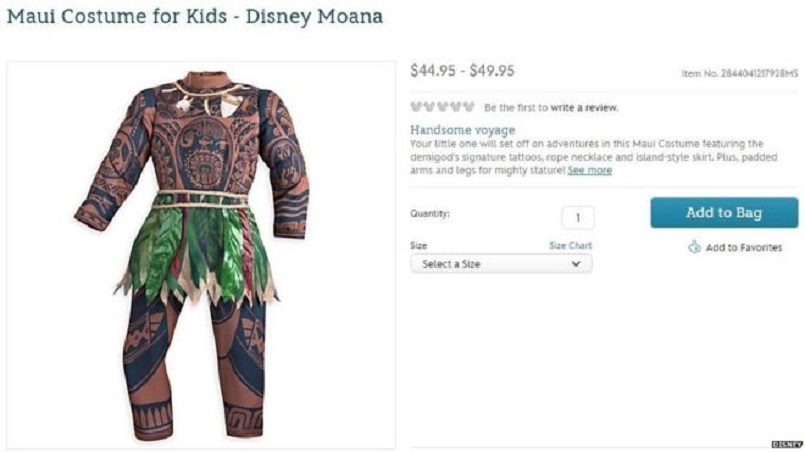
Disney has withdrawn a children's costume promoting its forthcoming film Moana, after accusations of cultural appropriation.
The costume, a full-body suit with brown skin, traditional tattoos, grass skirt and bone necklace, represents the character Maui, considered a demi-god and ancestor by many Polynesians.
Activists said it was "brownface", or mocking of the culture by creating stereotypes.
Disney said it regretted any offence.
"The team behind Moana has taken great care to respect the cultures of the Pacific Islands that inspired the film, and we regret that the Maui costume has offended some," it said in a statement.
"We sincerely apologise and are pulling the costume from our website and stores."
'Set off on adventures'
The film, due for release in November, tells the story of Moana, a young girl who teams up with the demi-god Maui to make an ocean voyage and save her people.
The character of Moana has been widely welcomed because she is feisty, independent and with a more realistic body shape than most Disney female leads.
She also has no love interest in the story, which was written by New Zealand Maori film-maker Taika Waititi.
But when the trailer for Moana was released in June, many people were offended by the depiction of Maui, saying he was an "obese" caricature of Polynesian men.
Among the merchandise promoting the film was the Maui costume, on sale for about $44 (£34).
It was advertised as helping children "set off on adventures", with his "signature tattoos" and clothing.
Among the angry responses were people saying "our skin is not a costume", and pointing out that white-skin outfits are never sold for white characters.
A Pacific Islander view: Arieta Tegeilolo Talanoa Tora Rika
I understand the reasoning behind the grass skirt and the necklace, but the brown skin is too far, and the tattoos are culturally misappropriated.
Tattoos are deeply meaningful to Pacific people. Like a fingerprint, a tattoo is unique to each person.
Our markings tell a personal story that we carry with us on our skin, everywhere we go - constantly reminding us of our values, our people, and our identity.
It is considered taboo and extremely disrespectful in many Pacific cultures to wear the markings of a people or place that you are not spiritually or physically connected to.
After the release of Moana, Maui may be a Disney character to some, but to many Pacific people, he is very real - a hero, ancestor, demi-God and a spiritual guide.
